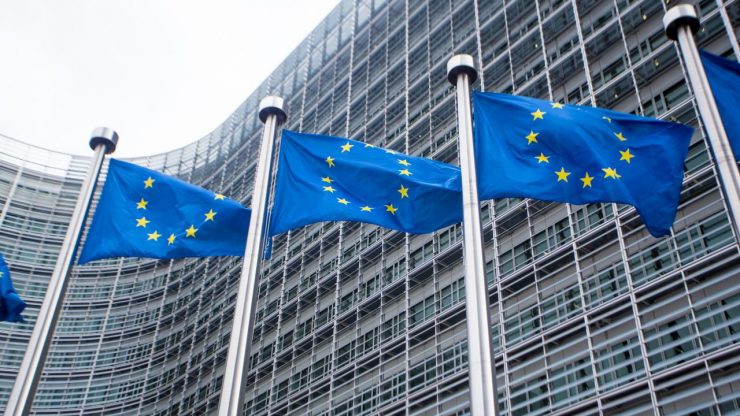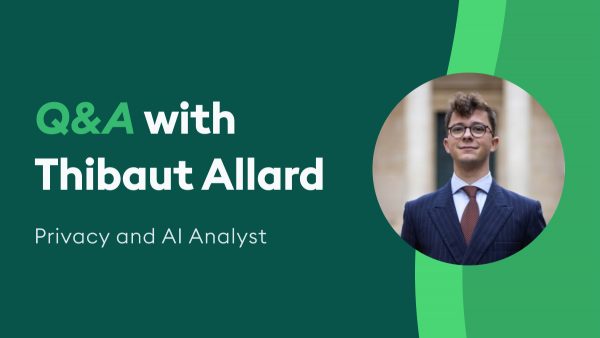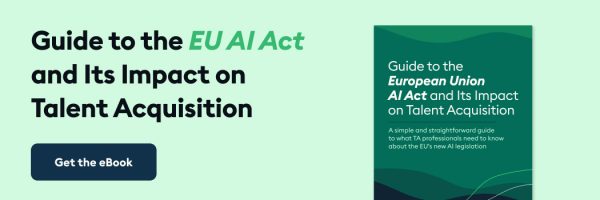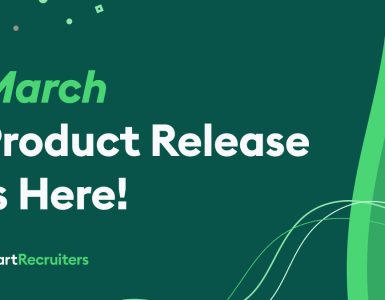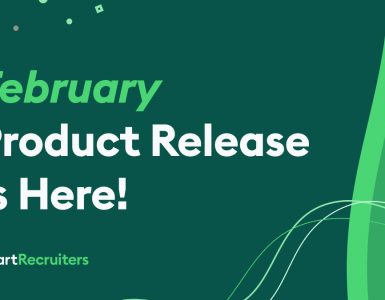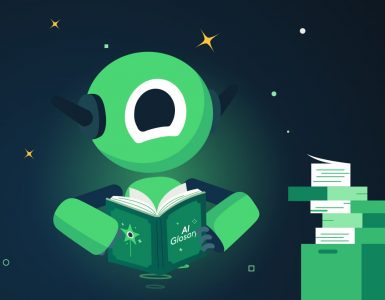Over the last decade, AI has subtly integrated into our daily routines, often without us even realizing it. From social media algorithms to customer service chatbots, AI has been quietly transforming how we live and work. But in 2022, with the public release of ChatGPT, the influence of AI became undeniable. And this is just the beginning. The global AI market is expected to soar to $826 billion by 2030, reflecting its enormous potential and reach.
As AI continues to revolutionize various sectors, it also brings new challenges and risks, highlighting the urgent need for clear guidelines. Enter the European Union’s AI Act, the world’s first comprehensive framework for governing the use and development of AI technologies. Set to take effect over the next three years, this legislation could become a global standard, shaping how AI is regulated worldwide. In talent acquisition, AI has the potential to transform processes and increase ROI, but the stakes of bias or mismanagement are high. Understanding the nuances of this new law is more important than ever for TA teams.
To help us unpack the complexities of the EU’s AI Act and its implications for recruiting, we turn to Thibaut Allard, Privacy and AI Analyst for SmartRecruiters. With a master’s degree in Digital Law from the University of Paris I: Panthéon-Sorbonne, Thibaut brings a wealth of expertise in navigating the intersection of AI and data privacy. In this interview, he will explore the risks and opportunities presented by the new legislation and what it means for the future of talent acquisition.
What is the purpose of the EU’s new AI legislation?
There are two major goals of the AI Act. First, to safeguard against the social risk this technology poses in terms of privacy and bias, especially in impactful industries like finance, healthcare, and recruiting. Being screened for a loan, organ transplant, or job are all high-stakes scenarios that could change the course of a person’s life. Second, to create an environment where responsible AI can be developed so the European Union can remain competitive with this technology by enabling a quality-centered approach.
What do companies using AI in recruitment need to do to prepare for this legislation?
In basic terms, organizations will need to catalog their use of AI and from there, determine the level of risk and associated regulations. My advice is to use this opportunity to determine your overall strategy as a company for AI in recruiting and other departments. Having this north star will help your team determine where AI is best used and to what risk level.
What lessons can we learn from GDPR for the EU AI Act?
In many ways, GDPR can be seen as a precursor to the AI Act. The proper processing of personal data as well as transparency and control for the end user are at the core of both pieces of legislation. The primary takeaway is that data governance is your friend. When you have clear processes around data hygiene it’s easier to adhere to regulations and demonstrate compliance when needed.
What’s your advice for companies who want to use AI ethically and fairly in the recruiting process?
AI is a sexy topic right now! There are still so many unknown possibilities that can fuel conversation and debate. It touches our imagination in an enchanting way as the challenges and stakes are enormous. So cutting through the noise can be difficult but I think focusing on these three aspects can help enormously when it comes to AI best practices.
- Risk Management: As the purpose of most AI legislation and especially the EU’s AI Act is to protect people, understanding and adhering to this legislation will already put organizations in a good spot in terms of implementing AI ethically and fairly.
- Data Governance: Ensure you have the right expertise in your organization, such as a Data Protection Officer (DPO), to guide data best practices. If AI is the car, then data is the fuel. We have to ensure the fuel is high-quality, otherwise, we’ll see problems with the car.
- Human Oversight: Review the outputs of using AI in your process with an eye for any patterns of bias. Expanding the ‘AI as a car’ metaphor, humans are still the driver – we need to maintain the car and direction in order to get where we want to go.
Why should organizations use AI in their recruiting process?
There is great potential to improve the recruiting process with AI. AI can help TA teams be more efficient and fair leading to higher ROI and, I hope, eradicate hiring discrimination and humanize hiring. However, there are are also factors dissuading organizations from using AI in recruiting – especially in Europe. For example, the risk of bias or other unintended impacts of AI technology or the investment needed to comply with the AI Act at a time when we are all under pressure to show concrete profit from any investment.
Is the answer then to avoid AI altogether? I don’t think so. Organizations that do that will likely find themselves at a competitive disadvantage in the future. The key here will be to have a tangible vision for AI and associated goals. Check out this article ‘How to Get Started with AI in Recruitment’ for more on that. We can’t ignore that AI is predicted to contribute trillions of dollars of annual corporate global profit so not using AI is like leaving money on the table.
Should we expect more legislation around AI over the coming decade?
I would absolutely expect more AI legislation to come down from the European Parliament. In my opinion, one likely scenario would be the creation of specific AI guidelines for each major industry like healthcare, finance, and of course, recruiting.
Overall, I think the days of the Wild West for the tech industry are over. Given how crucial this industry is to the running of our world from communication to logistics and everything in between, I predict that in the future, Tech will be as regulated as Finance.
How does the DPO’s role evolve in overseeing AI compliance within recruiting practices under the new legislation?
DPOs will definitely be involved in the oversight of AI and personal data governance at their organizations. We may also see more ‘Chief AI Officers’ or the like in companies wanting to access the EU market. It will be key for leaders to have experts around them who understand AI and this legislation in order to execute business decisions.
What is SmartRecruiters doing to accommodate the EU AI Act, and what are the future plans?
Right now we are assessing how AI is used currently in our platform as well as our future plans for leveraging AI in the system and cross-referencing that with the risk level and associated requirements. Once this stage is concluded we will mobilize the relevant departments and employees to take action on our obligations as both a provider and deployer. Our approach to compliance is that the right foundations make proper actions easier in the future so we put heavy emphasis on making the right decisions early.
Beyond adhering to the requirements of the AI Act, our team’s goal is to be a resource for the C-suite so they can make informed decisions about SmartRecruiters’ AI strategy going into the future. We believe AI is an important part of the next generation of recruiting and we want to be sure to have a positive impact on both recruiting teams and candidates.
The SmartRecruiters product team follows a “compliance by design” principle, ensuring that regulatory compliance is embedded in every stage of our product development process. As part of this, we continuously assess and map our current platform and future roadmap plans for risk levels and compliance requirements, including the EU AI Act. This proactive approach allows us to incorporate compliance recommendations from the very beginning of product development, helping to ensure our AI-driven solutions are responsible and ethical from the outset.
In addition to meeting the necessary compliance standards, we prioritize building trust and transparency with our customers and users. To support this, we’ve established a Trust and Safety Committee, which includes key customers, industry experts, and our internal R&D and compliance leadership. This committee collaborates to share best practices and help shape the future of AI at SmartRecruiters, driving responsible innovation in alignment with both regulatory requirements and ethical standards.
In the upcoming months, our customers will have access to more documentation and content that outlines our approach, guiding principles, and the internal measures we are taking to ensure ethical and compliant AI usage.
What resources or tools would you recommend for HR professionals to stay updated and compliant with AI regulations in recruiting?
The European Parliament website has many articles explaining the legislation in easy-to-parse language that is applicable across industries. In addition, Ravit Dotan, Phd and Raymond Sun are great resources to follow on LinkedIn.
Learn more about the AI EU Act
Thibaut recently appeared on the Recruiting Brainfood Live webinar, EU AI Act: Implications for Recruiters, Talent Acquisition & HR.
Download our ebook with everything TA professionals need to know about the Act.


